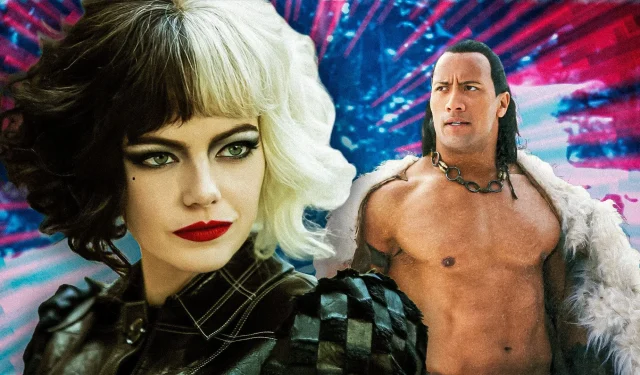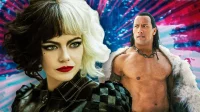Creating successful prequel films presents a unique set of challenges, particularly when original fans are skeptical about their necessity. While these movies can offer intriguing insights into character backstories, they often fail to generate the same emotional stakes as their predecessors, as audiences are already aware of the eventual outcomes.
The most compelling prequels introduce fresh perspectives or narratives that justify their existence, whether by recontextualizing the original films or functioning as captivating standalone adventures. Maintaining a receptive audience is crucial, though it’s a rare achievement in this genre.
10 Cruella (2021)
Cruella: An Iconic Villain with Unnecessary Origins
Cruella de Vil stands as one of Disney’s most memorable animated villains, yet the demand for insights into her past, particularly her journey into haute couture, was hardly overwhelming. The film navigates this potentially unappealing premise remarkably well, thanks to a stellar cast and the creative vision of director Craig Gillespie.
However, Cruella makes some questionable narrative choices, such as the decision to “humanize” the character by depicting her mother’s tragic death at the hands of Dalmatians. This element feels somewhat contrived, resembling a parody of the tragic villain trope, which underscores the disjointed tonal shift prevalent in the transition from animation to live-action.
9 Mufasa: The Lion King (2024)
A Controversial Take on Disney’s Legacy
The live-action adaptations of Disney classics have stirred considerable debate, particularly among purists who argue that these remakes primarily serve commercial interests. The Lion King exemplifies this dilemma, having received mixed reviews and facing unfavorable comparisons to its animated predecessor, despite grossing over $1 billion worldwide.
With Mufasa: The Lion King, Disney continues down the path of live-action remakes, much like with Cruella. This prequel appears to add little to the beloved franchise that fans were clamoring for, yet its financial success indicates that Disney remains unperturbed by critical reception.
8 The Scorpion King (2002)
An Unexpected Spin-off from The Mummy Franchise
While The Mummy films featured a variety of memorable characters, Mathayus was not among those with a strong demand for his own film. The Scorpion King marked a further decline for the franchise and failed to reach the commercial heights of its predecessors.
The film did, however, provide Dwayne Johnson with his breakthrough leading role. While it may seem cynical to suggest this was the driving force behind the prequel, there was little narrative necessity for The Scorpion King. Ultimately, it spawned its own series of sequels, outpacing the original Mummy films.
7 The King’s Man (2021)
A Franchise Stalled by a Lackluster Prequel
Following the success of The Secret Service and The Golden Circle, the Kingsman franchise appeared poised for future growth. However, the lukewarm reception of The King’s Man has placed further installments on hold. This prequel explores the origins of the Kingsman agency amidst the turmoil of World War I.
Unfortunately, The King’s Man received significantly poorer reviews than its predecessors, with its convoluted plot overshadowing exciting action sequences. It also underperformed at the box office, leaving the intriguing cliffhanger involving Adolf Hitler unresolved.
6 Solo: A Star Wars Story (2018)
Excessive Prequels in the Star Wars Universe
Since the launch of the original Star Wars trilogy, the franchise has been rife with self-referential arcs and timelines, incorporating movies and TV series that precede A New Hope, beginning with a divisive prequel trilogy. While some installments shine, Solo: A Star Wars Story serves as a prime example of an unnecessary narrative addition.
Disney produced one remarkable prequel with Rogue One, but fans didn’t express a desire for insights into Han Solo’s origins. A major issue is that it’s difficult to replicate Harrison Ford’s unique charisma, a challenge faced by Alden Ehrenreich. Han Solo thrives in mystery, and upcoming Star Wars films aim to strike a balance between fresh narratives and additional prequels.
5 Furiosa: A Mad Max Saga (2024)
A Prequel Lacking Key Character Presence
After the explosive success of 2015’s Mad Max: Fury Road, expectations for a follow-up were high. However, nearly a decade later, fans were met with Furiosa, which didn’t quite align with their hopes. While Charlize Theron’s character is beloved, few anticipated a prequel featuring a different actress in the titular role.
A more anticipated Mad Max sequel featuring Tom Hardy could have been a more fitting continuation. The commercial performance of Furiosa indicates it struggled to resonate with fans, despite receiving some favorable reviews.
4 A Quiet Place: Day One (2024)
Diminishing the Unique Strengths of the Franchise
A Quiet Place captivated audiences upon its release, yet Day One emerges as an unnecessary prequel that somewhat detracts from the original’s allure. The franchise’s brilliance lies in its intelligent worldbuilding, which immerses viewers in a haunting atmosphere without exposition. Day One undermines much of this engaging mystery.
The anticipated A Quiet Place Part III promises to return to the main narrative, rendering Day One an unwarranted diversion. The prequel faced lackluster box office results and poor critical reviews, compounded by fan disappointment over the absence of a direct sequel.
3 The Thing (2011)
A Lackluster Prequel to a Timeless Classic
John Carpenter’s The Thing stands as a quintessential film that should have remained untouched. Yet, Universal Pictures approved a prequel that echoes many scenes from the original. The 2011 version occurs just prior to Carpenter’s film, culminating directly in its opening sequence.
The 2011 installment often comes off as a forgettable retread of a cinematic masterpiece, invariably suffering from unfavourable comparisons. A sequel or prequel to The Thing felt largely unnecessary, particularly given its lack of innovative storytelling.
2 Hannibal Rising (2007)
An Unrequired Exploration of Hannibal’s Past
Hannibal Rising seeks to provide a backstory for one of cinema’s most infamous antagonists but opts to make him unexpectedly relatable. Portraying the cannibalistic serial killer as a Nazi hunter introduces a moral complexity that undermines established character lore.
The film endured poor critical reviews and disappointing box office returns, suggesting that audiences were uninterested in expanding Hannibal Lecter’s backstory. In contrast, the TV series Hannibal, starring Mads Mikkelsen, presented a far superior prequel, demonstrating the viability of the concept given a better approach.
1 Monsters University (2013)
A Missed Opportunity for Sequel Potential
Monsters Inc. ranks among Pixar’s most beloved films, yet the studio’s track record with sequels and prequels has been inconsistent. While franchises like Toy Story continue to thrive, others like Finding Dory and Incredibles 2 have fallen short of their predecessors. Unfortunately, Monsters University mirrors this trend.
Having waited over a decade between Monsters Inc. and its prequel, the second film fails to justify its existence. While there are fleeting moments of humor, the story lacks the engaging narrative of the original, and the college backdrop diminishes tension. Early concepts for a sequel involving Mike and Sully venturing into the human realm might have produced a more captivating film.


